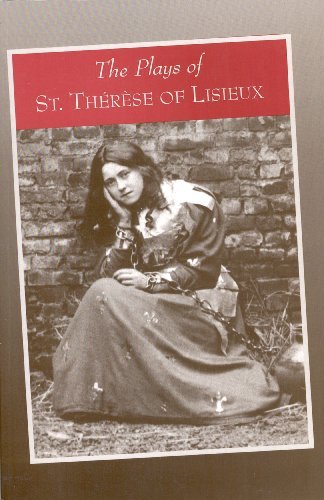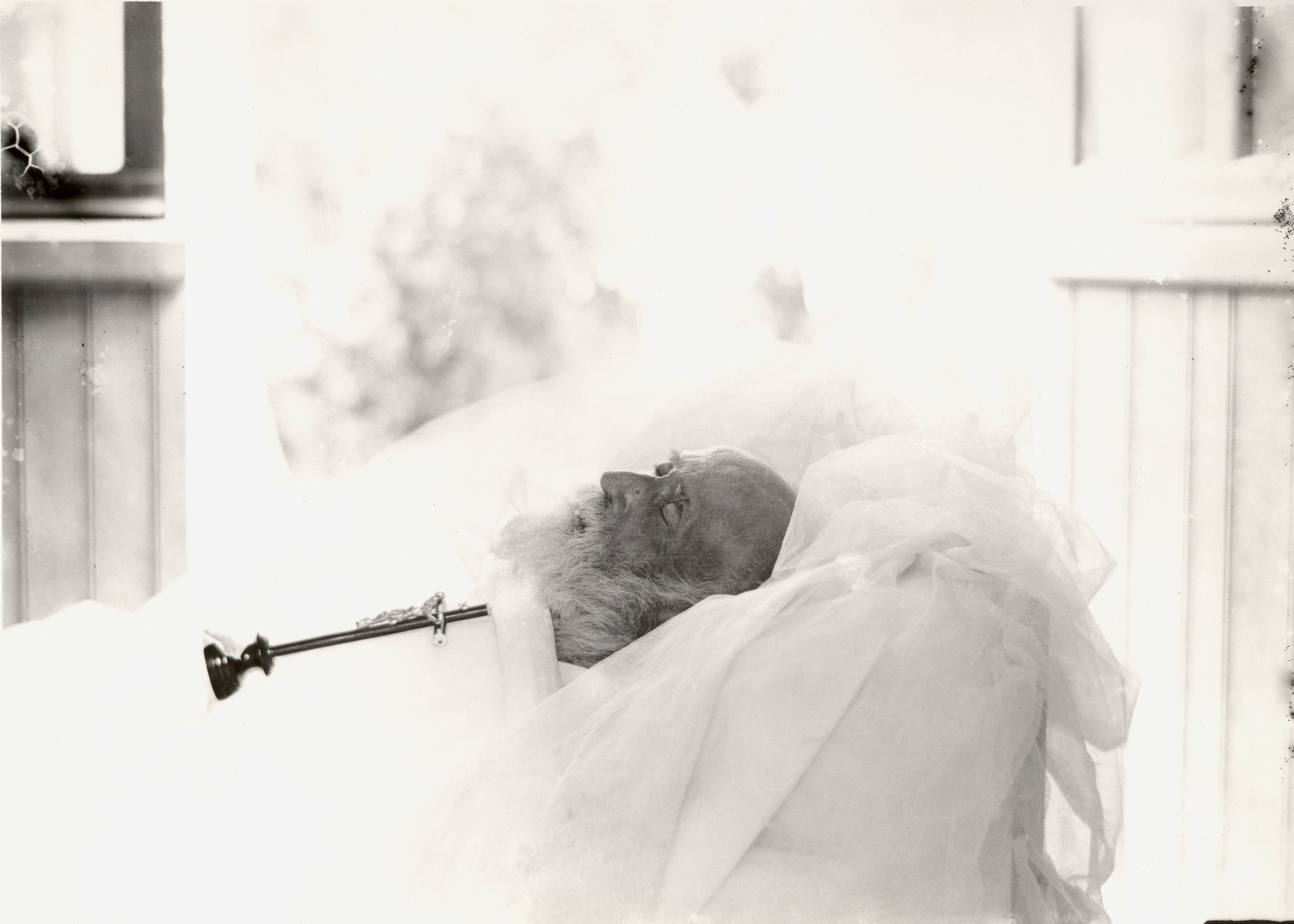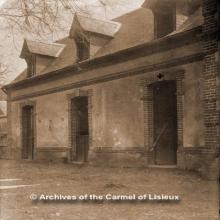Saint Therese of the Child Jesus
of the Holy Face
Entries in July 29 1894 (2)
125 Years Ago with St. Therese: She wrote and acted in a play, "Jesus at Bethany," for the feast of St. Martha, July 29, 1895
Jesus at Bethany, Therese's fourth 'pious recreation'
for the feast of St. Martha, July 29, 1895
At the Lisieux Carmel, the feast of St. Martha on July 29 was celebrated as the feast of the lay-sisters. At that time the monastery, somewhat mirroring the class structure from which its applicants came, had two ranks of sisters: the choir nuns, who recited the Divine Office in choir, and the lay-sisters, called in French "converse." The lay-sisters, of whom there were five in Lisieux Carmel in 1895, wore a white veil all their lives. They did not recite the Divine Office, substituting a certain number of "Our Fathers." They went to bed earlier than the choir nuns and got up earlier, and they were responsible for much of the monastery's heavy domestic work: cooking, gardening, looking after the poultry. They often came from poorer families and had had less education than the choir nuns.
On the feast of St. Martha, the roles were reversed. All the choir nuns gave small presents to the lay-sisters, and, because a much richer menu was permitted, the benefactors of the monastery, the Guerin family, sent in lavish treats for them. See the letter of Marie Guerin (Sister Marie of the Eucharist) to her parents in 1896, thanking them for melons, chocolates, and other delicacies. All the lay-sisters signed it.
The lay-sisters were not allowed to set foot in the kitchen; instead, the novices had free rein there on that day. For the novices, the day was somewhat hilarious; see Marie Guerin's letter to her father in 1898 describing their adventures and how thoroughly they enjoyed the feast.
In 1895 St. Therese wrote a simple but profound play, "Jesus at Bethany," for the feast-day recreation. It had only three characters: Jesus (played by Therese); Mary (played by Marie of the Trinity); and Martha (played by Therese's sister Celine, Sister Genevieve of St. Teresa). It is a dialogue in which Jesus speaks at length first with Mary and then with Martha. All the lines are written to be sung (to four different melodies). Note that, like many people at that time, Therese believed that St. Mary Magdalene was a former prostitute and that she and Mary of Bethany, the sister of Martha and Lazarus, were the same person. Thus her character is called "Magdalene."
Unlike other authors, although Therese mentions the contrast between contemplation and action that Mary and Martha are often thought to represent, she does not dwell chiefly on it. Instead, her interest is in whether the "pure soul" (Martha) or the "repentant soul" (Mary, in the play usually called only "Magdalene") can love God more. In the first manuscript of her memoir, which she is writing this year, she presents this conflict, expressing her profound conviction that the pure soul can love at least as much. God has loved that soul more by preventing it from falling in the first place.
Mary is grieved that she has caused Jesus sorrow, but he assures her that
with a single stroke of flame
I can change hearts.
Your soul, made young again
By my divine look,
Will bless me without end
In eternal life.
This theme of the divine "look" that instantly rejuvenates the soul is dear to Therese; it appears in the "Offering of myself to Merciful Love" she had just made on June 9. Her Jesus insists that he loves both sisters:
My goodness without equal
Would like that the sinner
And the virginal soul
Rest on My heart.
He promises Mary that one day she will rise higher than the angels and asks her on earth 'to draw hearts to Me." Martha enters the dialogue with the complaint she makes about her sister in the gospel. He acknowledges Martha's generosity but wants something more from her. She realizes:
I finally understand it, Jesus, supreme beauty.
Your divine look has penetrated my heart.
All my gifts are too little, it is my soul itself
That I must offer You, O very loving Savior . . . .
Jesus tells Martha that she offers him innocence and Mary has humility. Martha understands the union of their apostolate:
Jesus, to delight You, I want all my life
To despise honors and human glory.
While working for you I will imitate Mary
Seeking only Your divine gaze.
Therese insists gently that it is not whether one is engaged in work (which must be accompanied with "fervent prayer") or in contemplative prayer that matters; "it is your heart that I desire." These are only four verses from this artless but significant "pious recreation," which sheds light on a theme extremely personal and dear to Therese.
 Thanks to the generosity of the Washington Province of Discalced Carmelites and the Web site of the Archives of the Carmel of Lisieux, you can read the text of Jesus at Bethany online. When you have done so, I highly recommend consulting the volume The Plays of Saint Therese of Lisieux, perhaps the least-known volume of the works of St. Therese published by the Institute of Carmelite Studies. Its introductions and notes set forth the community context in which each play was written and performed and offer invaluable insight into the place each composition has in the tradition of the Teresian Carmel and in Therese's personal development.
Thanks to the generosity of the Washington Province of Discalced Carmelites and the Web site of the Archives of the Carmel of Lisieux, you can read the text of Jesus at Bethany online. When you have done so, I highly recommend consulting the volume The Plays of Saint Therese of Lisieux, perhaps the least-known volume of the works of St. Therese published by the Institute of Carmelite Studies. Its introductions and notes set forth the community context in which each play was written and performed and offer invaluable insight into the place each composition has in the tradition of the Teresian Carmel and in Therese's personal development.
I thank the Web site of the Archives of the Carmel of Lisieux for the two letters of Marie Guerin which give us such a personal taste of this annual feast.
The anniversary of the death of Blessed Louis Martin on Sunday, July 29, 1894
 Louis Martn in death. La Musse, 1894. Photo credit: Carmel of Lisieux
Louis Martn in death. La Musse, 1894. Photo credit: Carmel of Lisieux
The letter from Celine Martin, at La Musse, near Evreux, to her Carmelite sisters in Lisieux to tell them about the death of their father:
July 29, 1894
Dear little sisters,
Papa is in heaven! . . . I received his last breath, I closed his eyes. . . . His handsome face took on immediately an expression of beatitude, of such profound calm ! Tranquility was painted on his features . . . He expired so gently at fifteen minutes after eight.
My poor heart was broken at the supreme moment; a flood of tears bathed his bed. But at heart I was joyful because of his happiness, after the terrible martyrdom he endured and which we shared with him . . . .
Last night, in a sleep filled with anguish, I suddenly awakened; I saw in the firmament a kind of luminous globe . . . . And this globe went deeply into the immensity of heaven.
. . . . . . . . . . .. . . . . . . . . . . . . . . . . . . . . .. . . . . . . . . . . . . . . . . . . . . .. . . . . . . . . . . . . . . . . . . . . .. . . . . . . . Today, St. Martha, the saint of Bethany, the one who obtained the resurrection of Lazarus . . . .
Today, the gospel of the five wise virgins. . . .
Today, Sunday, the Lord's day . . . .
And Papa will remain with us until August 2, feast of Our Lady of the Angels. . . .
Your little Celine
(from Letters of Saint Therese of Lisieux, Volume II. Washington, D.C.: copyright 1988 by Washington Province of Discalced Carmelites, ICS Publications, pp. 874-875. Used with permission).
See also Marie Guerin's meditation, in 1895, on the first anniversary of Louis Martin's death
Below, courtesy of the Web site of the Archives of the Carmel of Lisieux, is a photograph of the small building at La Musse in which Blessed Louis Martin died on that Sunday morning a hundred and eighteen years ago.

